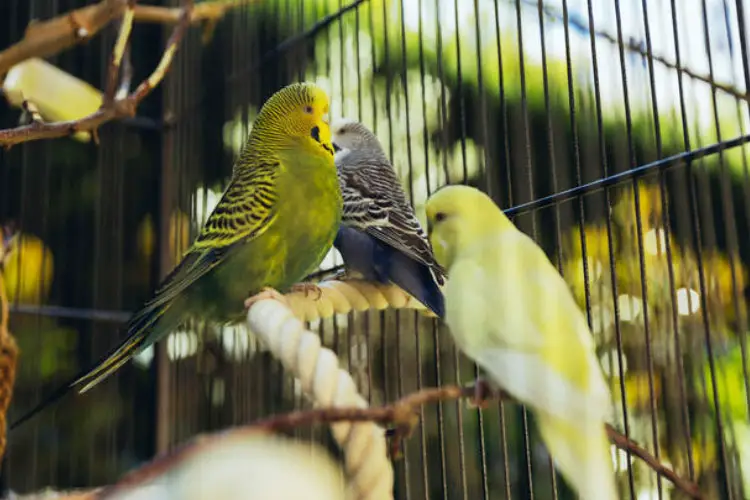Taking your budgies’ cage outside in summer can be a good way for them to catch fresh air and some sunshine. But you may be wondering whether this idea is safe for budgies and if you can leave the cage outside.
Can I put my budgie’s cage outside in summer? Taking your budgies’ cage outdoors in the summer is a good idea as the weather is warm. But make sure you provide your budgies with a shade to prevent overheating due to hot weather. And don’t leave your cage unattended due to potential predators.
The article discusses important tips to consider when taking your budgie cage outside in summer including what temperatures are too hot for your budgie, providing shade and water, and keeping your pet bird safe from predators.
Can I Put My Budgies Cage Outside in Summer?
Your budgie will definitely love the idea of getting outside in the summer. The weather itself is ideal and permits the bird to be out without worrying about any health issues arising.
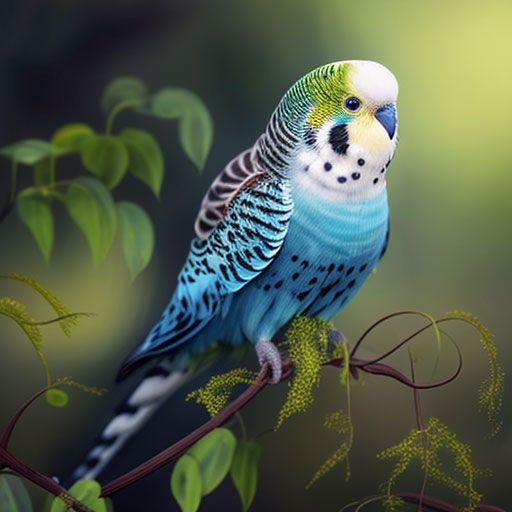
It’s also a great opportunity for your budgie to catch some light breeze and sunlight. It will get to soak in some vitamin D from the natural sunlight rays which is beneficial to its health.
Given that your budgie is an indoor pet and usually gets the sun through the window, this would be a great opportunity for it to get direct sunlight. Just make sure the sun doesn’t get too hot.
Your budgie may also try talking to the wild parrots flying by your garden which makes them happy.
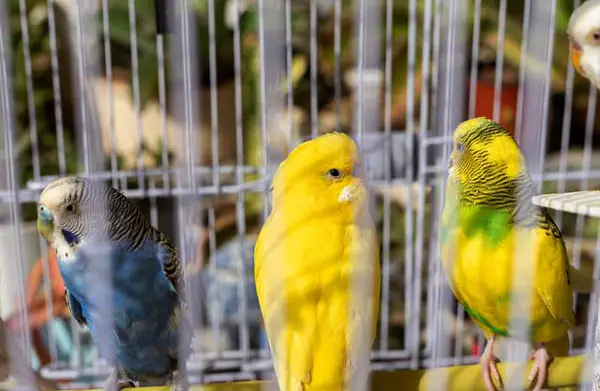
If possible, you can also remove the sliding bottom part of the cage to enable your budgie to run around on the grass—just like its wild cousins.
But make sure there are no possible openings for your budgie to escape through.
How do you put your budgies’ cage outside in summer?
Below are key aspects to consider when taking your budgie cage outdoors in summer for your pets’ safety and comfort.
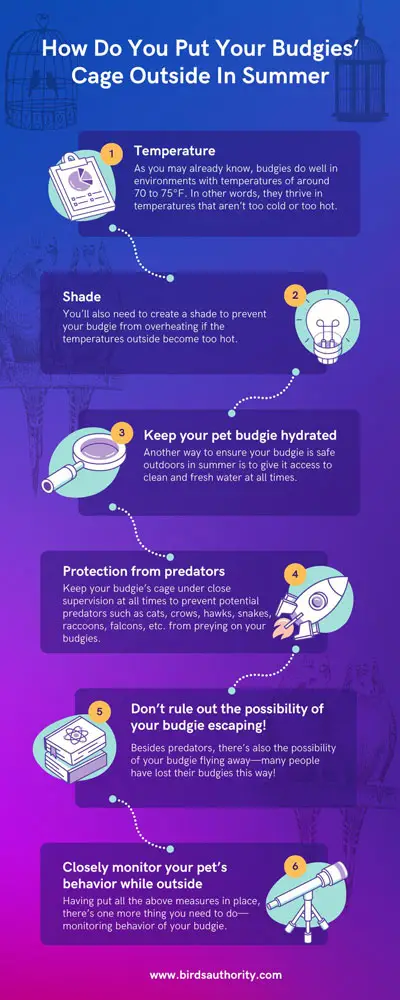
Temperature
As you may already know, budgies do well in environments with temperatures of around 70 to 75°F. In other words, they thrive in temperatures that aren’t too cold or too hot.
That said, you want to ensure the summer temperatures aren’t too hot as they can lead to overheating in your budgie. This can put the bird at risk of heatstroke, which can turn fatal.
Provide your budgie with a shade to keep safe from direct sunlight and exposure to high temperatures.
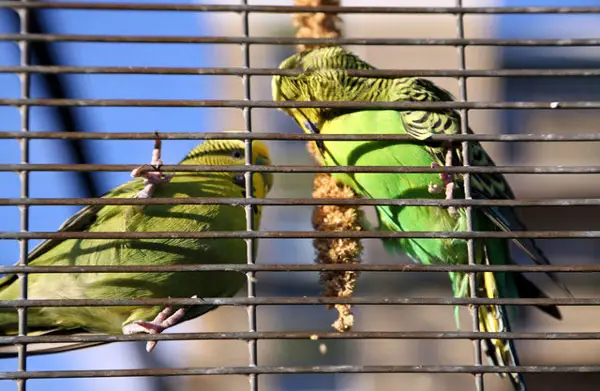
Shade
You’ll also need to create a shade to prevent your budgie from overheating if the temperatures outside become too hot.
This can be something as simple as throwing a towel over its cage to shield it from direct sunlight.
Alternatively, you can place the cage somewhere there’s shade that blocks direct sunlight, e.g. under a patio umbrella or tree in your yard.
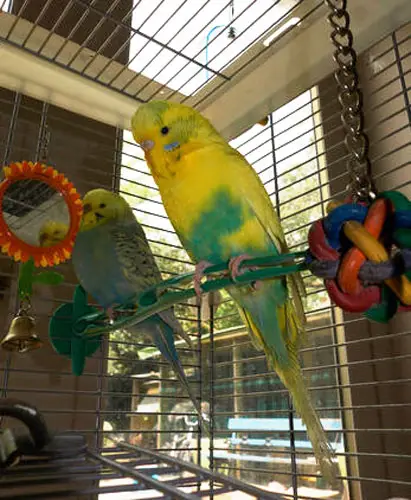
We suggest positioning your budgie enclosure to sit in partial shade and partial sun to enable your budgie to enjoy the best of both worlds.
Above all, position your cage such that it enjoys adequate airflow/ventilation—this helps keep your pet cool.
Keep your pet budgie hydrated
Another way to ensure your budgie is safe outdoors in summer is to give it access to clean and fresh water at all times. Remember, hot weather has dehydrating effects on animals.
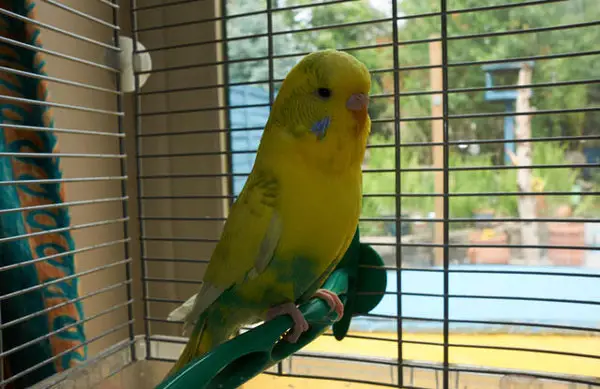
Protection from predators
Keep your budgie’s cage under close supervision at all times to prevent potential predators such as cats, crows, hawks, snakes, raccoons, falcons, etc. from preying on your budgies.
Many budgie owners share stories of how they step away from the cage for just a few minutes only to find cats and other potential predators approaching the cage. They can be that sneaky!
There are also horror stories of various predators grabbing the birds through the mesh, wiggling their way in through the spacebars, knocking the outdoor cage over and killing the bird, or scaring the budgie to death.

Such cases show that a predator doesn’t need to get inside to kill your budgie. So, just don’t leave your budgie’s cage outside unattended.
NOTE: Interacting with wild animals is generally not recommended for your budgie. They may transfer diseases and parasites to your birds who may then pass them to your other family pets or even you!
Don’t rule out the possibility of your budgie escaping!
Besides predators, there’s also the possibility of your budgie flying away—many people have lost their budgies this way!
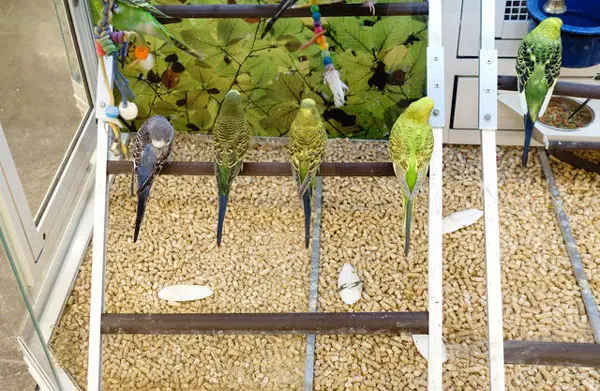
You want to ensure that your cage is completely secure and no doors can easily pop open (wire shut them if possible doors). This will further prevent the possibility of a predator getting your little caged guy.
Closely monitor your pet’s behavior while outside
Having put all the above measures in place, there’s one more thing you need to do— monitoring behavior of your budgie.
Check if it shows any abnormal signs such as panic, stress, lethargy, etc. If you notice any of these odd behaviors, take your budgie inside immediately and seek veterinary help as soon as possible.
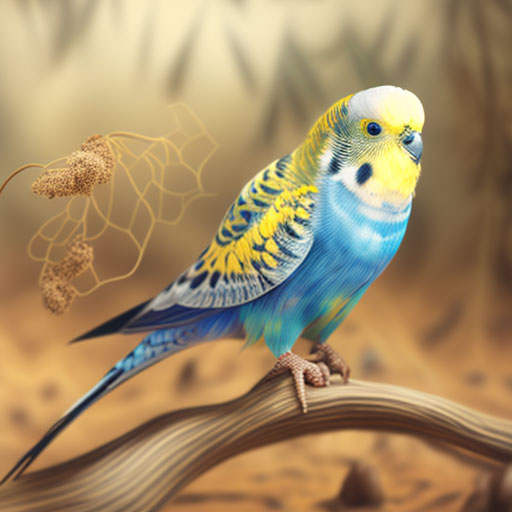
Also, if your budgie looks like it’s getting cold (probably due to windy weather), hot, or generally uncomfortable outside, bring him inside.
FAQs:
Budgies can live outside in summer as long as you put the necessary measures in place as we’ve discussed in the above guide.
Your budgie should not be under direct sunlight for more than 30 minutes to 1 hour to prevent overheating. Make sure you provide your budgie with shade, water, and a water bath to help keep it cool.
A budgie that’s too hot will start panting as it tries to cool itself down. It will also get lethargic, lying on the cage floor, become stressed and aggressive, and may even tilt its head severely. If you notice a couple of these signs in your budgie when outside in summer, it’s most likely overheating and you should contact your vet immediately!
Final Verdict
Taking your budgies’ cage outside in summer allows them to enjoy the fresh air and soak in some natural sunshine which is beneficial to their health. But before you take your cage outside, you need to keep in mind that these little cuties are sensitive to temperature changes, so you want to ensure the temperature is perfect for them.
Make sure you provide the budgie with shade, and plenty of drinking water, and don’t leave their cage outside unattended. Monitoring health of your budgie when outside is also important. If you notice any odd behaviors, bring your budgie inside and call your vet immediately.
